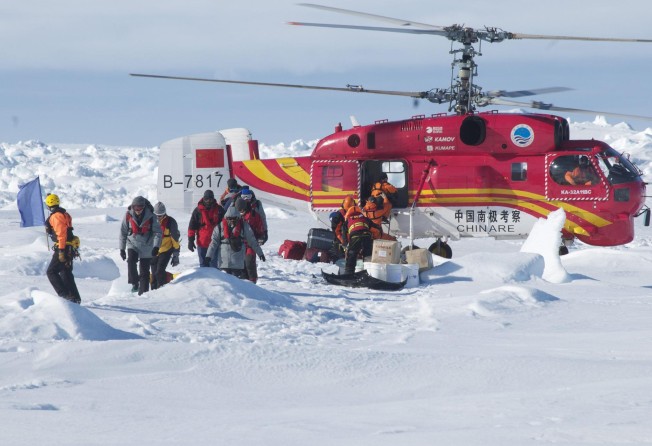Antarctic mystery heats up with ships trapped in ice

We have been following recent events in the Antarctic with some interest. Readers will be aware that the good ship Shokalskiy set off with a team of scientists, paying tourists, and a few journalists to investigate the impact of global warming on the region. It is not without irony, as others have observed, that the vessel then became trapped in the ice along with the Chinese icebreaker Xue Long. Its helicopter transferred the 52 scientists and passengers to an Australian icebreaker, the Aurora Australis.
The event has caused many to wonder what is happening in Antarctica, since reports by some climate scientists, those that believe that man's activities are causing global warming, had led us to believe that Antarctica was undergoing unprecedented melting. Yet at the same time we are told there is more ice than ever before in the area. But then we are told this is because Antarctica is losing continental ice, while sea ice has been increasing by about 1 per cent per decade.
Last week, the British Antarctic Survey announced that the melting of the Pine Island Glacier ice shelf, in Antarctica, had suddenly slowed in the past few years, confirming earlier research which suggested its earlier melting was not due so much to man-induced global warming but to "particular climatic conditions".
Dr Pierre Dutrieux, from British Antarctic Survey, said: "We found ocean melting of the glacier was the lowest ever recorded, and less than half of that observed in 2010. This enormous, and unexpected, variability contradicts the widespread view that a simple and steady ocean warming in the region is eroding the West Antarctic Ice Sheet. These results demonstrate that the sea-level contribution of the ice sheet is influenced by climatic variability over a wide range of time scales."
Parliament wins graft award
We hear a lot about corruption in China but the annual award for corruption awarded by the Organised Crime and Corruption Reporting Project went to the Romanian parliament.
Each year the non-profit group has numerous candidates to choose from while sifting through instances of fraud, money laundering, bribery, human trafficking and drug smuggling.
"Organised crime groups and corrupt persons have been wildly successful in 2013," the organisation's website says. But its Person of the Year Award goes to the Romanian parliament, which last month approved an amendment to the criminal code which will give its members as well as other elected government officials immunity from corruption charges.
The amendment declared that the Romanian president, senators, lawyers and members of the lower chamber are no longer public officials, and can therefore no longer be indicted for bribery, abuse of office or conflict of interest. Government officials already convicted of corruption will be exonerated.
President Traian Basescu has voiced his concerns and said he would send it back to the parliament, but he can only do so once, and the parliament is not obliged to heed his objections. According to the Romanian anti-corruption prosecutor's office, 28 members of parliament have been convicted or are on trial for corruption and more than 100 mayors and vice-mayors are on trial for graft.
Brave new world
We are indebted to Financial News for the following story: a few years ago a senior investment banker was on holiday on a remote Scottish island. With no mobile phone reception and desperate for news from the City, he walked for miles to the island's only post office to buy a newspaper. When he finally got there, he found that the only newspapers available were a day old. "I'd like to buy today's newspaper, please," he said to the shopkeeper. "Well I'm afraid you'll have to come back tomorrow," she replied.
This, the paper says, is indicative of how we should view the constant restructuring that has been under way at investment banks over the past year. Come back tomorrow or ideally in five years' time. Monster banks like JPMorgan, Citi and HSBC have hoovered up market share. Goldman Sachs has made an impressive comeback, while others such as Barclays and DBS have so far struggled to get to grips with the new order. But it is not over yet.
Have you got any stories that Lai See should know about? E-mail them to [email protected]